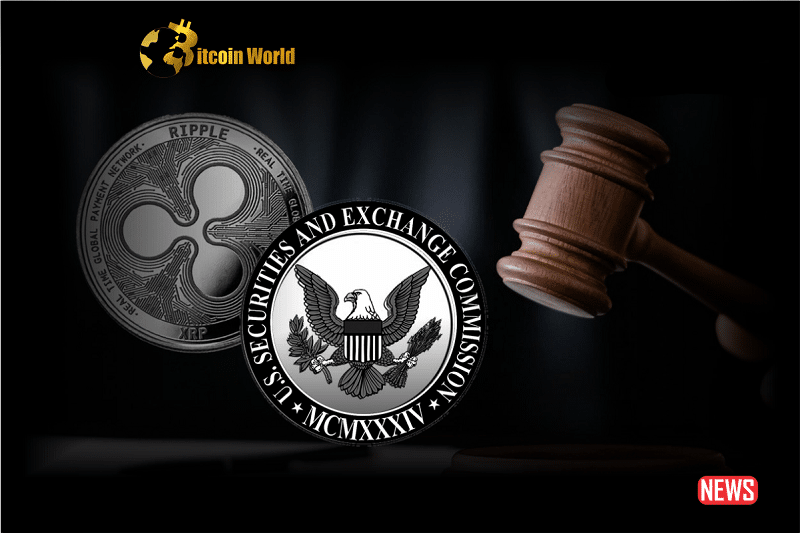Buckle up, crypto enthusiasts! The rollercoaster legal battle between Ripple Labs and the U.S. Securities and Exchange Commission (SEC) just took another dramatic turn. Just when you thought the dust was settling after a landmark ruling, the SEC is back, demanding an appeal that could freeze everything in its tracks. What’s the latest, and why should you care? Let’s break down this critical development in the crypto world.
Why is the SEC Appealing Now?
Remember Judge Analisa Torres’s ruling in July? It was a partial victory for Ripple, stating that XRP, when sold programmatically on exchanges, is not a security. This was huge! But the SEC isn’t backing down. They’ve officially asked the court to grant them an ‘interlocutory appeal.’ Think of it as hitting the pause button on the current proceedings while a higher court reviews a specific aspect of the case. Essentially, the SEC wants to challenge Judge Torres’s interpretation of the law before the entire case concludes.
The SEC’s core argument? They believe the judge’s ruling raises ‘knotty legal problems,’ specifically around the application of the famous Howey Test. This test is the go-to framework to determine if an asset is an ‘investment contract’ and thus, a security under U.S. law. The SEC is essentially saying the court got it wrong when applying the Howey Test to XRP’s programmatic sales.
Decoding the Howey Test – What’s the Fuss?
For those new to the crypto legal jargon, the Howey Test boils down to these four key questions:
- Investment of Money: Is there an investment of money? (Generally, yes, when you buy crypto)
- Common Enterprise: Is there a common enterprise? (Pooling of funds or efforts)
- Expectation of Profits: Is there an expectation of profits? (Hoping your crypto value goes up)
- Solely from the Efforts of Others: Are these profits expected to come primarily from the efforts of a promoter or third party? (This is the tricky part in crypto)
The SEC argues that even with programmatic sales, buyers of XRP were still relying on Ripple’s efforts to increase the value of XRP. Judge Torres disagreed in part, drawing a distinction between institutional sales and programmatic sales. This distinction is what the SEC is now challenging.
Gensler’s Stance vs. SEC’s Actions: A Contradiction?
Here’s where it gets even more interesting. SEC Chairman Gary Gensler has consistently stated that existing SEC rules are perfectly adequate for regulating the crypto market. His message has been loud and clear: most cryptocurrencies are securities and should play by the SEC’s rules.
So, why the appeal now? If the rules are so clear, as Gensler claims, why is the SEC seeking an appeal to clarify the application of those very rules? This apparent contradiction hasn’t gone unnoticed.
Industry Reacts: ‘Hypocrisy’ and ‘Unfair Notice’
Ripple’s Chief Legal Officer, Stuart Alderoty, didn’t hold back, labeling the SEC’s move as “hypocritical.” He pointed out the SEC’s past insistence that the crypto rules were crystal clear and must be followed. His tweet echoed the sentiment of many in the crypto space: if the rules were so clear, why the urgent need for an appeal?
The SEC now admits that there are “knotty legal issues” that need to be appealed. The same SEC that for two years told the court and the world that the rules were “clear” and “everyone was on notice.” Hypocrisy doesn’t even begin to cover it.
— Stuart Alderoty (@s_alderoty) August 13, 2023
Coinbase’s Chief Legal Officer, Paul Grewal, also weighed in, questioning how crypto firms are expected to operate with “fair notice” when fundamental legal questions remain unresolved in court. This highlights a core frustration within the crypto industry – regulatory uncertainty.
Timeline of the Appeal Saga
Let’s recap the recent appeal timeline:
- August 2023: SEC initially announces its intention to appeal and stay Judge Torres’s decision, citing “substantial grounds for differences of opinion.”
- September 1, 2023: Ripple files a memorandum opposing the SEC’s request, arguing the SEC lacks sufficient grounds for appeal.
- Recent Filing: SEC further presses the court to grant the interlocutory appeal motion.
What Does This Mean for XRP and the Crypto Market?
The ongoing legal tug-of-war keeps XRP in a state of limbo. While the programmatic sales ruling was a positive step for Ripple, this appeal injects fresh uncertainty. For the broader crypto market, this case is a crucial bellwether. The outcome could significantly shape how cryptocurrencies are classified and regulated in the U.S.
Here’s what’s at stake:
- Precedent Setting: This case could establish a legal precedent for applying the Howey Test to crypto assets, especially regarding sales on exchanges.
- Regulatory Clarity (or Lack Thereof): The appeal process could either bring more clarity to crypto regulation or further muddy the waters.
- XRP’s Future: The appeal outcome will directly impact XRP’s regulatory status in the US and its future trajectory in the crypto market.
- Broader Crypto Regulation: The case is being closely watched by the entire crypto industry as it could influence future SEC enforcement actions and regulatory approaches.
The Road Ahead: What to Expect?
The court will now consider the SEC’s motion for interlocutory appeal. There’s no guaranteed timeline, but this process could take months. The cryptocurrency industry remains on tenterhooks, awaiting the next chapter in this landmark legal battle. Will the SEC succeed in its appeal? Will this lead to clearer crypto regulations, or further confusion? One thing is certain: the Ripple vs. SEC saga is far from over, and its ripples will be felt throughout the crypto world for years to come.
Disclaimer: The information provided is not trading advice, Bitcoinworld.co.in holds no liability for any investments made based on the information provided on this page. We strongly recommend independent research and/or consultation with a qualified professional before making any investment decisions.




